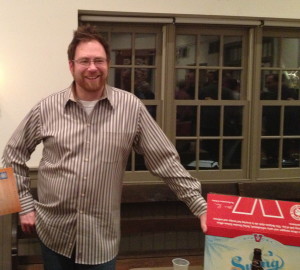Victory Brewing Co. co-founder entertains crowd at CFHS
By Kathleen Brady Shea, Managing Editor, The Times

Bill Covaleski, co-founder of Victory Brewing Company, shares more beer samples and conversation after his well-received lecture at the Chadds Ford Historical Society.
Bill Covaleski, co-founder of Downingtown’s thriving Victory Brewing Company, owes a considerable amount of debt; fortunately for him, much of it falls into the gratitude category.
Addressing an attentive crowd Tuesday night at the Chadds Ford Historical Society (CFHS), the 49-year-old entrepreneur presented a nearly two-hour compendium of beer history, global and personal. He interspersed the discussion with tastings, including Victory’s soon-to-debut offering, Swing Session Saison, which boasts lemon zest, orange peel, and Szechuan peppercorns.
Covaleski expressed thanks to a host of people: his father, an avocational home-brewer who initially piqued his interest; his longtime friend and business partner, Ron Barchet, whose shared vision spawned the company; their wives, who supported the idea; and former President Jimmy Carter, who legalized home-brewing in 1978, to name a few.
He said he grew up in Collegeville, where he met Barchet in 1973 on the school bus in fifth grade. They both had sisters who became friends and fathers who worked at General Electric, he said, ensuring a strong bond between the families.
When Barchet journeyed to UCLA to pursue a political-science degree and Covaleski stayed closer to home to study at Temple’s Tyler School of Art, the friendship never wavered. Covaleski said his BFA, which ultimately came in handy for designing beer labels, led to a period of unemployment that gave him time to see if he could replicate some of his father’s home brews.
In 1985, after three failed batches, his father expressed surprise: “What’s wrong with you? Mine tastes good.” That dismal reception marked a turning point, prompting Covaleski to return “to the science I’d neglected.” That same year, he gave Barchet a beer kit for Christmas, and both became hooked, eventually pursuing internships with masters in both the U.S. and Germany.
About 1993, Covaleski said he and Barchet opened a strong Belgian beer for their wives before broaching the subject of launching their own business. He said the beer effectively helped the women “accept this as a great idea.” The venture’s working title, Independence Brewing Company, immediately prompted a cease-and-desist letter from a slightly newer business with the same name, and their fund-raising efforts eventually started to sputter.
Their unanimous response – “Dude, this will be a victory if this ever happens” – inspired the name that led to a 1996 opening in Downingtown. Since its first-year output of 1,725 barrels, the business has boomed, producing 82,000 barrels in 2011. In fact, the operation has outgrown its space, and work is progressing on a bigger facility in West Sadsbury Township, which is expected to open later this year.
Covaleski said the business also owes a debt to the environment: The Downingtown plant gets its water from the east branch of the Brandywine Creek while the new Parkesburg facility will draw from the west branch. Headwaters Pale Ale, introduced to celebrate the company’s 15th anniversary, was created to “honor and respect the watershed.”
The company strives to implement green initiatives, some of which have generated awards, Covaleski said proudly, adding that nothing goes to waste. Spent grain supplements feed for local farmers, organic waste is turned into mulch, even shrink wrap from the restaurant is recycled, he said.
The business is also known for its civic stewardship, supporting multiple nonprofits. “That’s the way it should be,” Covaleski said. “The community is responsible for our success.” He said 36 percent of the company’s beer is sold in Pennsylvania; 11 percent goes to New Jersey. If you don’t wince at the $16 pricetag, you can purchase Victory as far away as Singapore.
The expansion will enable the pair to focus their energy on new product development. “People like lots of choices,” he said, adding that Parkesburg will carry the production load, leaving Downingtown available for trying new batches. “We only experiment to the level we feel comfortable,” Covaleski said. “We know we’re going to be drinking this stuff if no one else does.”
When Victory opened in 1996, it joined about 1,100 breweries – fewer than the 1,900 that existed prior to Prohibition. Last year, the number doubled to 2,200, Covaleski said. But he believes plenty of room exists for more growth, pointing out that the U.S. currently supports 7,000 wineries. “Craft brewing is on a great upswing,” he said.
The program was part of the Chadds Ford Historical Society’s 2013 Spring Lecture Series. Next up is a presentation on March 12 by Michael P. Rocco, who will offer insights from 70 years of exploring realism through watercolor. On March 9, the society will host an opening reception from 7 to 9:30 p.m. for Rocco, whose works will be on display through March 29.
A signature member of the American Watercolor Society for over 35 years, Rocco, who resides in Boothwyn, has participated in more than 36 solo shows. His strikingly realistic technique is grounded in his schooling at the Pennsylvania Academy of the Fine Arts under such renowned artists as Daniel Garber, John McCoy and Francis Speight, according to his web site.
For more information on the historical society, visit http://www.chaddsfordhistory.org. To learn more about the Victory Brewing Company and the myriad events it sponsors, visit http://victorybeer.com/about-victory/. Rocco’s web site is http://www.michaelprocco.com.




